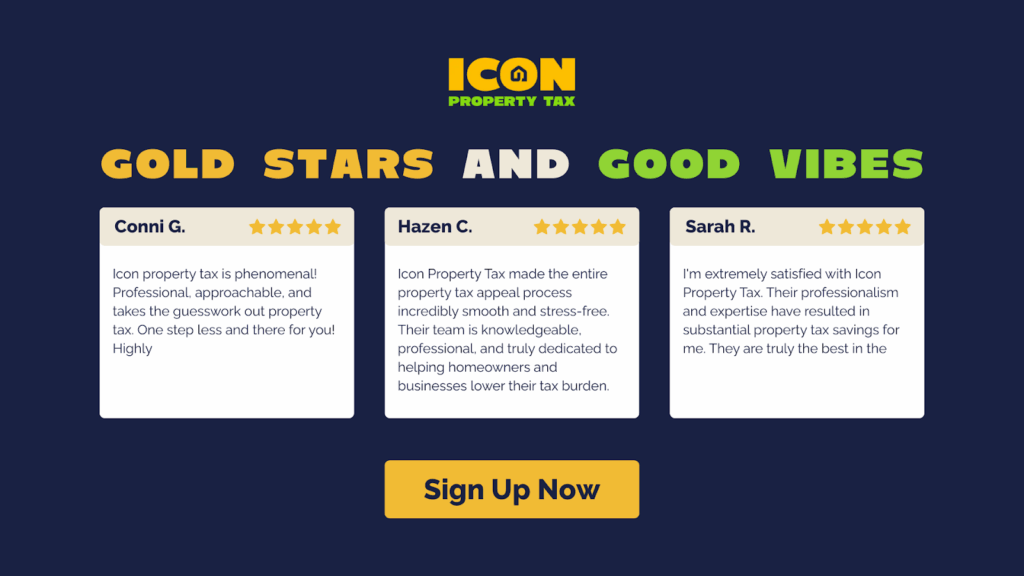Texas Personal Property Tax Guide: What You Need To Know
August 16, 2025
Key Takeaways:
- Tax Scope Clarified: Texas personal property tax targets income-producing assets, not personal household items.
- Annual Filing Required: Businesses must file an annual rendition to report assets and avoid penalties.
- Savings Are Possible: Professional help can lead to significant tax reductions, and you only pay if you save with Icon.
The Texas personal property tax often catches businesses off guard. Unlike real estate taxes, which most owners are familiar with, personal property tax targets the movable assets your company owns, things like equipment, computers, vehicles, and inventory. It’s not optional, and it’s not always fair. Many business owners overpay simply because they don’t understand how values are assessed or how to reduce them legally. Knowing how this system works is essential to avoid unnecessary expenses and comply with state requirements.
At Icon Property Tax, we’ve helped thousands of Texas businesses reduce their property tax liabilities, recovering millions in savings while navigating the complexities of state tax laws. With over a decade of experience, a proven no-savings, no-fee pledge, and deep familiarity with every appraisal district in Texas, we know what it takes to protect your investment and fight inflated valuations.
In this piece, we’ll discuss the Texas personal property tax, who it affects, how it’s calculated, and what strategies you can use to lower your tax burden while staying compliant.
What Is Personal Property Tax In Texas?
In Texas, personal property tax refers to a tax levied on tangible assets used to produce income. This includes items like machinery, equipment, furniture, and inventory owned by businesses. Unlike real property taxes, which apply to land and buildings, personal property taxes are focused on a business’s movable assets.
Texas counties collect this tax annually to help fund local services like schools, roads, and emergency services. It’s important to note that personal property tax in Texas applies mostly to businesses, not individuals, though there are a few exceptions.
The Texas Tax Code requires business owners to file a yearly rendition declaring their personal property and its value. This rendition is the foundation for how much tax will be owed, so accuracy is critical. If you’re unsure how to navigate the personal property tax system, Icon is here to help you get clarity and keep your compliance on track.

Who Has To Pay Personal Property Taxes?
In Texas, personal property taxes are primarily the responsibility of business owners. You must report and pay taxes on those assets if you own tangible assets that are used to produce income, like computers, office furniture, vehicles, or heavy machinery.
This applies to:
- Corporations and LLCs
- Sole proprietors and partnerships
- Leased equipment users (in many cases, both lessor and lessee have reporting responsibilities)
- Home-based businesses using equipment for income-generating activities
Even operating on a small scale, you’re still expected to file a rendition with your local appraisal district. Failing to do so can lead to penalties, increased assessments, or legal trouble.
Personal property tax can be complex, especially when juggling daily business operations. Many Texas business owners trust Icon to handle the details and help reduce their tax liability. We offer a no-savings, no-fee pledge, so you only pay if we save you money.
How Is Personal Property Tax Calculated In Texas?
Texas personal property tax is based on the market value of your business’s tangible assets as of January 1st each year. The process can feel complex, but it follows a fairly structured path:
Rendition Filing
Every business owner must submit a rendition that lists all personal property used for income-generating activities. This includes assets like office furniture, equipment, inventory, and vehicles. You’ll need to provide the original cost of each item, along with the year it was acquired, which helps the appraisal district estimate its current value.
Valuation By Appraisal District
Once your rendition is submitted, the local appraisal district reviews your declared assets and assigns a market value to them. This is typically done using standardized depreciation schedules, comparable market data, and industry-specific benchmarks. If they believe your reported values are too low or incomplete, they may revalue the assets or request additional documentation.
Tax Rate Application
Each taxing jurisdiction, such as the county, city, school district, or special districts, sets its own tax rate. These rates are applied per $100 assessed property value and vary depending on your business location. The combined total of these rates determines the effective rate that will be used to calculate your property tax.
Final Tax Bill
Once values are finalized and tax rates are set, your total tax bill is calculated by multiplying the assessed value by the total rate. For example, if your business assets are valued at $100,000 and your total tax rate is 2.5%, your tax bill would be $2,500. Reviewing the appraisal carefully is essential; many businesses overpay due to inflated valuations or reporting errors.
Key Deadlines For Texas Personal Property Tax Filing
Missing a tax deadline in Texas can lead to penalties, interest charges, or audits, so staying ahead of the schedule is critical. Here are the key dates every business owner should keep in mind:
January 1
This is the assessment date. The market value of your personal property is determined as of this date, even though the tax is not due yet. Any changes to your assets after January 1 won’t affect that year’s tax assessment.
April 15
This is the deadline to file your annual rendition with your local county appraisal district. If you need extra time, you may request an extension until May 15, but it must be submitted in writing before the original deadline.

May Through June
Appraisal notices are typically mailed during this time. If you disagree with the value assigned to your property, you can file a protest with the Appraisal Review Board (ARB), usually within 30 days of receiving the notice.
October Through January
Tax bills are sent out in the fall, and payment is typically due by January 31 of the following year. Paying late results in automatic penalties and interest, so it’s best to plan ahead.
How To Lower Your Personal Property Tax Burden
Reducing your personal property tax liability in Texas isn’t just possible, it’s an innovative business. Many companies unknowingly overpay each year because they aren’t aware of the strategies that can legally minimize what they owe. Here are some proven ways to lower your tax burden:
Review Asset Listings Regularly
Conduct a detailed inventory before filing your rendition to ensure that all obsolete, disposed, or non-taxable items are removed. Assets no longer in use shouldn’t be costing you money.
Apply Correct Depreciation Schedules
Using appropriate depreciation methods can significantly reduce the taxable value of your assets. Older assets should be reported at their current market value, not the original purchase price.
File On Time And Accurately
Accurate, on-time filings prevent penalties and reduce the risk of being over-assessed. Filing early also gives you time to correct issues before values are finalized.
Challenge Inaccurate Appraisals
If you believe your valuation is too high, file a protest. Many businesses don’t realize how often appraisal districts are willing to reduce assessments when given proper documentation.
Use A Professional Consultant
A qualified tax consultant can help you identify savings, correct errors, and navigate the protest process. We specialize in finding tax relief opportunities that businesses often overlook.
When you partner with Icon, we take care of the details so you can focus on running your business. Thanks to our no-savings, no-fee pledge, you have nothing to lose and only savings to gain.
Why Work With A Property Tax Consultant Like Icon?
Navigating Texas personal property tax laws can be overwhelming, especially for businesses juggling daily operations. That’s where a specialized property tax consultant like Icon makes a real difference.
We don’t just fill out forms; we strategically manage your tax liability. Our team knows how local appraisal districts operate, how to value business assets correctly, and when and how to challenge inflated assessments. With us on your side, you’re not just staying compliant but optimizing your tax position.
Our clients count on us to:
- File accurate, on-time renditions
- Identify outdated or misclassified assets
- Analyze depreciation and fair market value for maximum savings
- Manage the protest process from start to finish
- Handle communication with appraisal districts on your behalf
Most importantly, we don’t get paid unless you save. Our no-savings, no-fee pledge means there’s no risk in having us examine your property tax situation.
Icon Property Tax is more than just a consultant; we’re your advocate in a system that often favors the taxing authority. Let us help you protect your investment while reducing your business’s financial load.

Final Thoughts
Texas’s personal property tax is a crucial part of doing business in the state, but it doesn’t have to be a burden. With the proper knowledge and partner, you can stay compliant, avoid costly mistakes, and significantly reduce your tax liability.
From understanding what’s taxable to meeting filing deadlines, each step in the process matters. But you don’t have to handle it alone. At Icon, we’re here to simplify the process, represent your best interests, and secure the savings you deserve.
Get started today and find out how much you could be saving. With zero upfront costs and a no-savings, no-fee pledge, there’s no reason to keep overpaying.
Read Also:
- DuPage County Property Tax Overview: Rates, Assessments, and Billing Cycles
- Kane County Property Tax Overview: Rates, Assessments, And Billing Cycles
- Will County Property Tax Overview: Rates, Assessments, And Billing Cycles
Frequently Asked Questions About Texas Personal Property Tax
What is considered exempt from the Texas personal property tax?
Items held for personal use, like household goods and personal vehicles not used for business purposes, are typically exempt. Inventory held for sale may also qualify for exemption under the Freeport or Goods-in-Transit exemptions.
Can leased equipment be taxed under the Texas personal property tax?
Yes, leased equipment is taxable. Depending on the lease agreement, the lessee, the lessor, or both, may have reporting and tax responsibilities.
Are home-based businesses required to file personal property taxes?
Yes, if a home-based business uses tangible property for income generation (e.g., computers, machinery, or tools), it must file a rendition and may owe personal property tax.
How long should I keep records of my business’s personal property?
You should keep detailed records for at least four years. This includes purchase receipts, asset ledgers, and past renditions, in case of audit or valuation disputes.
Can I appeal a penalty for late filing?
Yes, you can request a waiver of the penalty, but it must include documented good cause and is subject to approval by the appraisal district.
Is intangible property taxed in Texas?
No. Texas only taxes tangible personal property. Intangible assets such as patents, trademarks, or goodwill are not subject to individual property tax.
Do I have to file a personal property rendition if I closed my business?
If your business was operational on January 1 of the tax year, you must still file a rendition for that year, even if the company closed afterward.
Can I depreciate assets differently for taxes and accounting?
Yes. Texas appraisal districts use standard depreciation schedules for tax valuation, which may differ from those used in your business’s accounting or IRS filings.
What happens if I disagree with the protest decision?
If you’re unsatisfied with the Appraisal Review Board’s ruling, you can appeal the decision in district court or request binding arbitration, depending on eligibility.
Are businesses taxed differently based on industry?
Yes, while the basic rules apply statewide, valuation methods and depreciation rates may vary depending on your industry and asset types. Specialized businesses often benefit from industry-specific valuation expertise.

